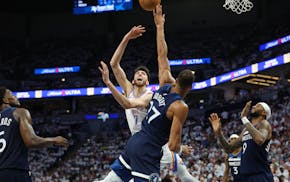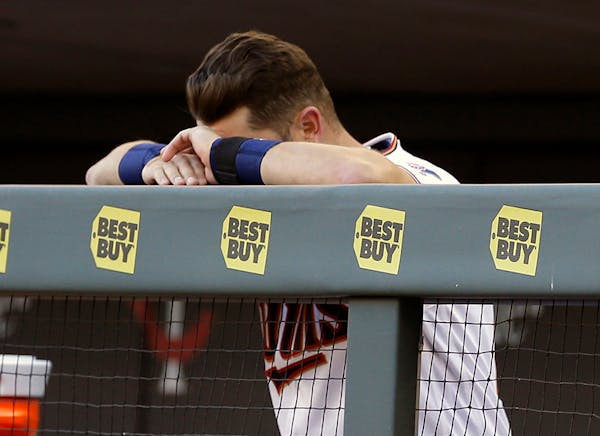The Twins struck out only seven times Monday. We say "only" because they have lofty standards when it comes to whiffs.
The Twins have become flag-bearers for flailing, Kings of the K's. They swing and miss more than a blindfolded golfer.
The Twins didn't reach their quota for strikeouts in the home opener, but they whiffed enough to keep their offense toothless in a 4-1 loss to the Chicago White Sox at Target Field.
The Twins increased their season total for strikeouts to 79 in seven games, maintaining a decent pace in their pursuit of major league baseball's record for strikeouts.
Maybe we should start a daily tracker for their march toward history.
"I see people are projecting how much we're going to beat the record by," manager Paul Molitor quipped.
At least he's maintained a sense of humor watching his players wear a path from the batter's box back to the dugout.
Their 72 strikeouts entering Monday led MLB, a pace that would obliterate the hallowed record of 1,535 whiffs held by the 2013 Houston Astros.
Let's see, 11.3 strikeouts per game X 162 games = doomsday. Actually, their total would be 1,828 at the current rate, meaning the record could fall this summer.
"I don't think anybody is surprised that we're going to have a team that's going to strike out a fair amount," Molitor said before Monday's game. "It's been over the top here the first six games."
That's putting it kindly. Absurd works, too.
Their propensity for strikeouts not only sabotages their offense, but it's also boring to watch. Poor plate discipline puts them in unfavorable situations and then the outcome often becomes predictable once the count reaches two strikes.
Does anyone have any faith in Byron Buxton or Byung Ho Park or Miguel Sano at present if they reach two strikes in the count?
"We're not an organization that just accepts strikeouts," Twins General Manager Terry Ryan said.
Their lineup certainly suggests the organization is at least willing to tolerate strikeouts in the short term because this whiff parade was entirely predictable.
Second baseman Brian Dozier set a club record with 148 strikeouts last season. Buxton and Park have looked overmatched at times. Sano strikes out a lot. Eddie Rosario swings at any pitch in the same area code.
That's a recipe for strikeout soufflé.
"If you look at our lineup, it's not like we're going to be some punch-and-Judy's that flay the ball all over the place," Dozier said. "But there are times when you can cut down on strikeouts, and we have been striking out too much. I'm not going to say we're going to go up there and keep trying not to strike out. That's not how you play the game, and anybody that does is delusional."
This problem is not isolated to 1 Twins Way. Strikeouts have increased leaguewide as a philosophical shift toward a more general acceptance of them.
Teams averaged 7.7 strikeouts per game last season compared with 6.5 a decade ago. Teams averaged 8.4 strikeouts per game the first week of this season.
"I'm not crazy about [that]," said Hall of Famer Rod Carew, who never struck out more than 91 times in his 19-year career. "They take a strikeout as if it's nothing. To me, when you walk up to home plate, it's all about swinging the bat and getting base hits."
Theories abound for why strikeouts have increased steadily: better pitching, more flamethrowers in bullpens, larger strike zone and a fascination with home runs.
"[Strikeouts are] a bigger part of the game," Molitor said.
Too big in the Twins' case. They're costing themselves opportunities to advance runners and they're not forcing the other team to make a defensive play by fanning so feebly.
Molitor said he wants to see adjustments made at the plate.
"If you're continually having the same issues — chasing high fastballs or swinging at breaking balls in the dirt — it's more about what you're thinking about as a hitter as opposed to mechanics or anything like that," he said. "If you're doing the same thing over and over, that's what gets disappointing."
The first seven games qualify as a major disappointment. Their strikeout total is ridiculous. They're not putting any pressure on the other team. It's just been bad, boring baseball.
"We're not worried about our offense whatsoever," third baseman Trevor Plouffe said.
They might be the only ones who feel that way.
Chip Scoggins • chip.scoggins@startribune.com

Scoggins: Buckle up Wolves fans, it's going to be a very telling offseason
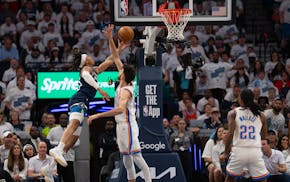
Scoggins: Finch's next challenge is to unleash the Wolves' youngsters
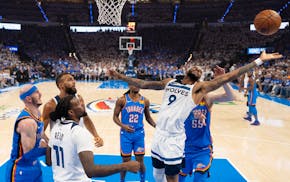
Scoggins: Timberwolves learn just how far behind they are
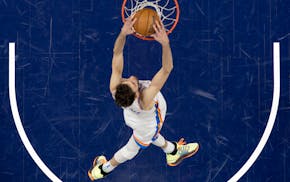
Scoggins: Chet Holmgren is in the right place at the right time
